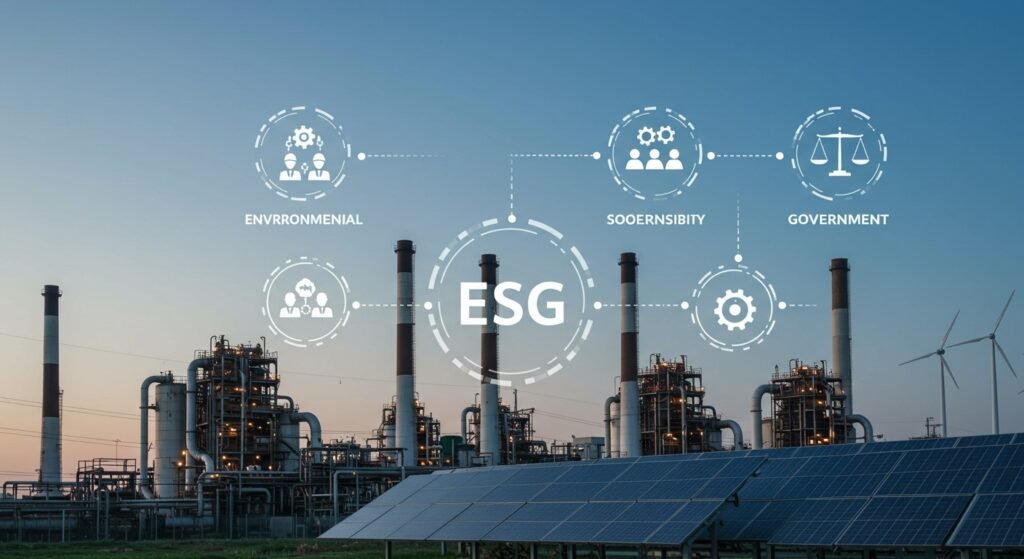ESG in Industrial Operations: Measuring What Really Matters
In today’s rapidly evolving business landscape, the concept of Environmental, Social, and Governance (ESG) has moved from a niche concern to a central pillar of corporate strategy, especially within industrial operations. For companies navigating complex supply chains, energy demands, and societal expectations, effective ESG reporting is no longer optional; it’s a strategic imperative. Measuring what truly matters in ESG enables industrial firms to enhance their reputation, attract investment, mitigate risks, and drive long-term sustainability. This article explores the critical aspects of integrating ESG into industrial frameworks and the importance of robust reporting.
Table of Contents
- Understanding ESG in Industrial Operations
- The Imperative for ESG Reporting
- Key Metrics and Challenges in ESG Reporting
- Implementing Effective ESG Strategies
- The Future of Industrial Sustainability
- Conclusion
Understanding ESG in Industrial Operations
ESG encompasses three core areas that define a company’s sustainability and ethical impact. In the industrial sector, these translate into specific operational considerations:
- Environmental (E): Focuses on the company’s impact on the natural world. This includes energy consumption, greenhouse gas emissions, waste management, water usage, and biodiversity preservation. For industrial companies, managing these factors is crucial for regulatory compliance and reducing operational costs.
- Social (S): Pertains to how a company manages relationships with its employees, suppliers, customers, and the communities where it operates. Key areas include labor practices, workplace safety, diversity and inclusion, human rights in the supply chain, and community engagement.
- Governance (G): Deals with a company’s leadership, executive pay, audits, internal controls, and shareholder rights. Robust governance ensures transparency, ethical decision-making, and accountability, which are vital for investor confidence and long-term stability.
Integrating these pillars into day-to-day industrial operations requires a comprehensive understanding of their interconnectedness and a commitment to measurable improvements.
The Imperative for ESG Reporting
The demand for transparent ESG reporting has surged from multiple stakeholders. Investors increasingly use ESG performance as a key indicator of a company’s financial health and future resilience. Consumers are more likely to support brands that demonstrate genuine commitment to sustainability and ethical practices. Furthermore, regulatory bodies worldwide are tightening requirements, making robust ESG data essential for compliance.
Driving Transparency and Accountability
Effective ESG reporting goes beyond mere compliance; it’s about building trust. By openly disclosing their environmental footprint, social initiatives, and governance structures, industrial companies can demonstrate accountability to stakeholders. This transparency fosters a stronger reputation, enhances investor relations, and can even lead to improved access to capital as lenders and investors increasingly favor sustainable businesses.
Key Metrics and Challenges in ESG Reporting
Identifying and tracking the right metrics is fundamental to meaningful ESG reporting. For industrial operations, this often involves complex data collection across diverse sites and processes. Here’s an example of key metrics:
| ESG Pillar | Example Metric | Why it Matters for Industrial Operations |
|---|---|---|
| Environmental | Greenhouse Gas (GHG) Emissions (Scope 1, 2, 3) | Direct impact on climate change, regulatory compliance, energy efficiency. |
| Social | Total Recordable Incident Rate (TRIR) | Workplace safety, employee well-being, operational efficiency. |
| Governance | Board Independence & Diversity | Ethical decision-making, stakeholder representation, reduced risk. |
Overcoming Data Collection Hurdles
One of the significant challenges in ESG reporting is the sheer volume and complexity of data. Industrial firms often operate across multiple geographies, each with unique regulations and data collection nuances. Implementing digital tools, automation, and standardized reporting frameworks (e.g., GRI, SASB) can streamline data collection, improve accuracy, and facilitate consistent reporting across the organization. This ensures that the insights generated are reliable and actionable, supporting strategic decision-making.
Implementing Effective ESG Strategies
Successful ESG integration requires a holistic approach, starting with top-level commitment and cascading down through operational processes. Industrial companies should begin by conducting a materiality assessment to identify the most significant ESG risks and opportunities relevant to their specific business. This informs the development of clear, measurable goals and targets.
Technology plays a crucial role, from real-time monitoring of energy consumption to supply chain transparency platforms. Investing in sustainable technologies and practices, such as renewable energy sources, circular economy principles, and advanced waste management systems, can yield significant long-term benefits. For further insights into how sustainable practices can boost your bottom line, explore our article on Industrial Sustainability Benefits.
The Future of Industrial Sustainability
The trajectory for ESG in industrial operations points towards increased integration, stricter regulations, and greater innovation. Companies that proactively embrace ESG principles will not only meet compliance requirements but also unlock new opportunities for competitive advantage, cost savings, and enhanced brand value. As global awareness of climate change and social equity grows, the pressure on industrial sectors to demonstrate responsible practices will only intensify. Staying ahead means continuous improvement and adaptation.
To learn more about global sustainability trends and their impact on industries, refer to external resources like the UN Global Compact, a leading initiative for businesses committed to responsible practices.
Conclusion
ESG reporting is more than just a regulatory burden; it’s a powerful tool for driving meaningful change and securing a sustainable future for industrial operations. By diligently measuring environmental impact, fostering positive social relationships, and upholding robust governance, companies can transform potential risks into opportunities for growth and innovation. Embracing ESG is not just about doing good; it’s about smart business, ensuring resilience and relevance in a world that increasingly values responsibility.


